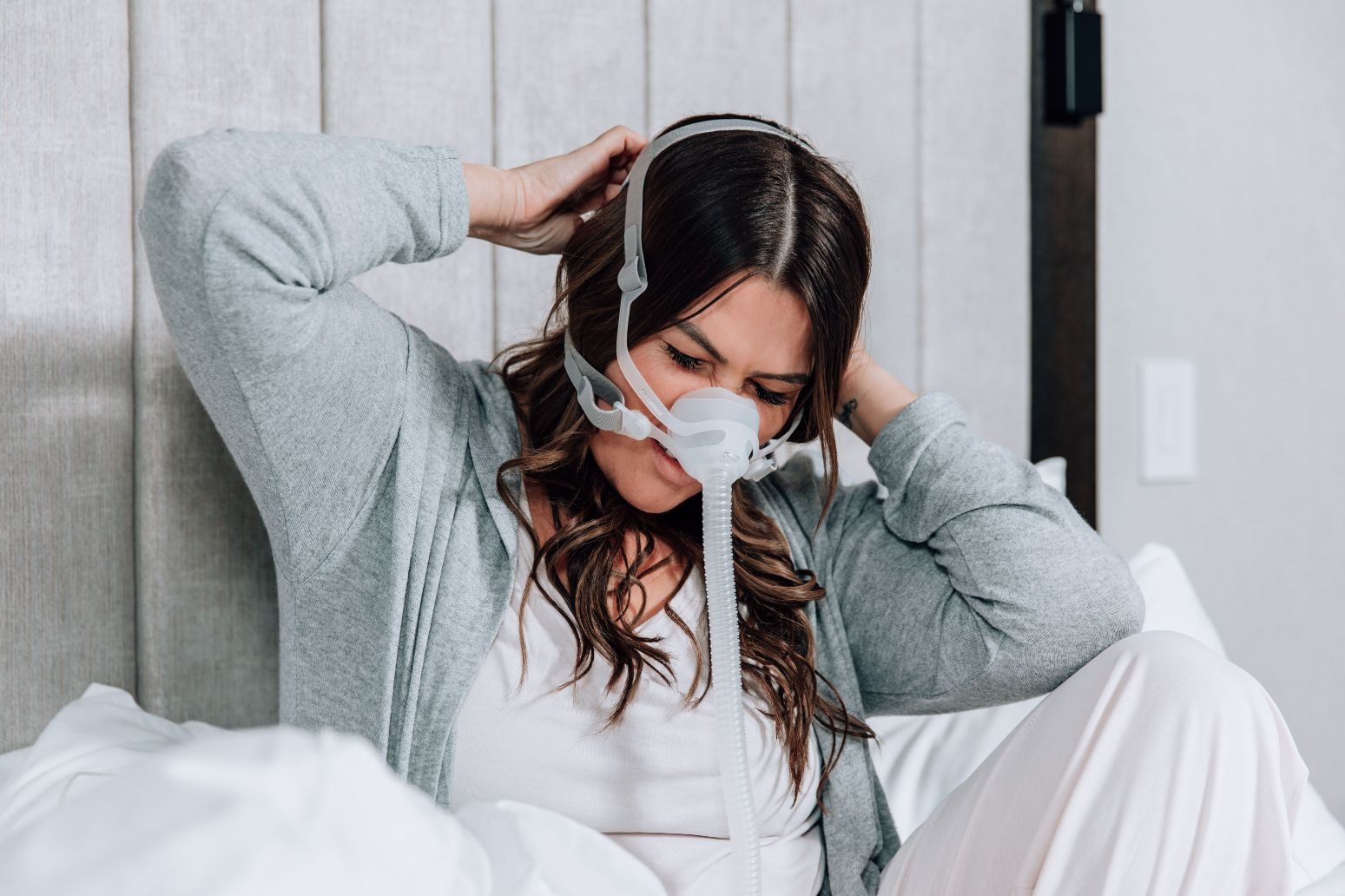CPAP machine use can prove to be tricky, especially if you’ve just received a sleep apnea diagnosis.
However, proper compliance is vital to your treatment plan, especially when it comes to ensuring payment for your machine from your insurance company.
Many patients find it uncomfortable or fail to find the type of machine or mask that works best for them, causing them to abandon treatment altogether.

In fact, more than 50% of patients stop CPAP machine use after their sleep study!
Lack of proper therapy is dangerous. If your CPAP therapy isn’t compliant, you’re not getting the proper sleep you need.
That’s why we’ve gathered all the reasons why compliance matters when it comes to CPAP machine use. Before we cover all the details, let’s first discuss what “CPAP compliance” truly means.
CPAP Compliance: What is It?
Whether you’ve just received your sleep apnea diagnosis or you were diagnosed years ago, you’ve likely heard the term “CPAP compliance” before.
Continuous Positive Airway Pressure (CPAP) devices are the most commonly prescribed form of treatment for the 22 million sleep apnea sufferers in the US.
CPAP devices work by sending a constant flow of pressurized air into the airway that keeps the muscles from collapsing, allowing the airway to remain clear while you sleep.

As a result, snoring and apneas (lapses in breathing) decrease throughout the night, preventing fragmented sleep and poor sleep quality.
CPAP compliance refers to the amount of time you receive the proper treatment from the device each night, on average. Without proper compliance, your CPAP therapy is less effective, putting your health at risk.
Why Does Compliance Matter?
CPAP machine use is essential for the proper treatment of most kinds of sleep apnea. If your treatment isn’t compliant, you’re at a higher risk for:
- Chronic daytime fatigue
- Irritability
- Heart disease
- Diabetes
- Reduced cognitive function
- Lowered physical performance
- High blood pressure
- Acid reflux
Your CPAP Compliance Report provides information about how effective your therapy is as you sleep. Simply putting the mask on isn’t enough to ensure that you’re receiving adequate treatment.
Your compliance report measures the amount of time you use the machine, ensuring that you aren’t at risk for daytime sleepiness or other health risks.

The standard usage requirement is 70% of nights for at least 4 hours each night. That means that within a month, you must use your machine for at least 22 nights.
CPAP air leaks are the most common culprit when it comes to diminishing compliance. Even if you use your device every night, all night long, leaks render the machine ineffective.
Leaks lower the air pressure delivered to the airway, leading to increased apneas, snoring, and poor sleep quality. Poor mask fit is a huge contributor to leaks that lower compliance.
Poor Mask Fit Leads to Mouth Leaks
As you may know, there are three main types of CPAP masks: full-face masks, nasal masks, and nasal pillows.
Full-face masks cover both the nose and mouth and tend to deliver the highest amounts of pressure. Nasal masks cover the nose only, delivering a medium pressure, while nasal pillows cover just the nostrils, delivering the lowest amount of pressure.
With nasal masks and pillows, leaks are more likely. That said, a poor mask fit in a full-face mask also increases the risk for leaks.

Determining a proper fit and proper pressure from the start is essential, as well as proper cleaning of your equipment to prevent deterioration or tearing.
Clean your mask, tubing, and filter in warm, soapy water regularly. If you notice any holes or issues, replace the parts immediately to ensure the effectiveness of your therapy.
If you suffer from nasal congestion, that could be another culprit ruining your compliance score.
Nasal Congestion Lowers Compliance
Being unable to breathe in and out of the nose is a huge challenge when it comes to CPAP compliance. Moreover, your machine may further dry out your nose and mouth, leading to an increased risk of congestion altogether.
Nasal sprays and other medications may help to reduce congestion and the effects of a dry nose, but you should always consult your doctor to avoid any complications.
Studies have shown that using cold humidification compared to heated humidification may help. However, more research is needed.
One of the best ways to reduce congestion is to learn how to properly breathe through the nose instead of the mouth. Mouth breathing worsens congestion, leading to more mouth breathing, leading to more congestion.
It’s a vicious cycle that only proper nasal breathing and tongue posture can help. Meeting the minimum requirements for proper CPAP compliance ensures that your insurance will agree to cover the cost. However, meeting the maximum requirements allows you to get the most benefits out of your CPAP machine use. You want to wake up well-rested and avoid any health issues associated with the mistreatment of sleep apnea. Mouth leaks are a huge cause of non-compliance. When air escapes through the lips, your CPAP machine isn’t able to deliver the proper amount of air to the airway. The easiest way to prevent mouth leaks? Keep the mouth shut as you sleep. Many sleep technicians or physicians may offer chin straps to use with your CPAP mask to achieve this result. However, chin straps are notoriously uncomfortable. Meanwhile, SomniFix has developed a product to help eliminate mouth leaks altogether (without the need for pesky chin straps). By using SomniFix Mouth Strips with your CPAP mask, you will greatly increase the quality of the sleep apnea therapy you receive each night. SomniFix prevents mouth breathing as you sleep by keeping the lips sealed. As a result, mouth breathing and mouth leaks become less frequent. Better yet, our mouth tape is hypoallergenic and made with sensitive skin in mind. Add SomniFix to your CPAP therapy regimen tonight and experience quality, compliant therapy as you sleep.
Mouth Breathing: The Largest Threat to Compliance

Want to Improve Compliance? Tape Your Mouth




